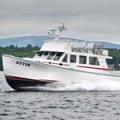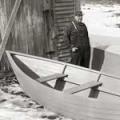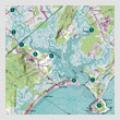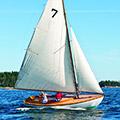A Letter From Home
But someone has to do it
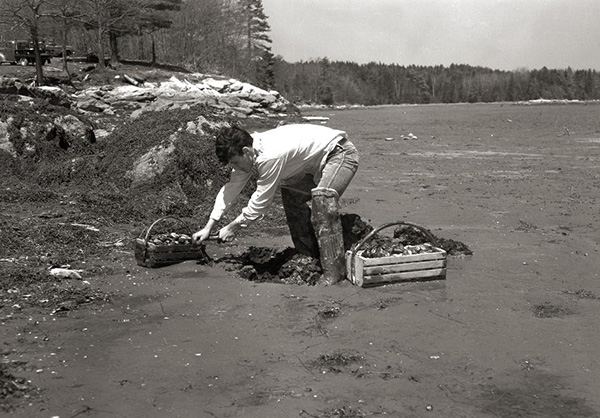 Digging for clams is backbreaking work, as this vintage photo by Everett "Red" Boutilier
shows. This image of Eugene "Bimbo" Clark was taken in the 1960s in Medomak.
Courtesy Penobscot Marine Museum
Digging for clams is backbreaking work, as this vintage photo by Everett "Red" Boutilier
shows. This image of Eugene "Bimbo" Clark was taken in the 1960s in Medomak.
Courtesy Penobscot Marine Museum
"How you enjoying the clamming, Bub?" he asks. I look at my broken-off fingernails and swollen knuckles, then at his hands that look worse. "I like it," I say.
Around here, clammers "pull" clams instead of digging them with a hoe-just follow the clam holes down with a middle finger and grab the clams in your palm, one by one, over and over. The mud can be soft or hard; either way it's often full of broken shells and hidden rocks, and the clams themselves are sharp enough to slice through both glove and skin. Your fingernails hook rocks or shells and bend back and break off. The knuckles swell and the hand numbs as you lean your body weight onto it, driving it hard into the mud like a trowel.
When the water hits my knees, and my boat is floating, I tumble my clams clean, scrub the mud from my hip waders, then climb into the boat. It's a six-mile run across the bay to the stone beach where my truck and trailer wait. Mussel shells like miniature boats dot the tidewater and plink off the fiberglass hull as I maneuver past ledges and shoals.
Forty minutes later, I back my truck and trailer up to the clam shop-a metal building attached to the offices of a lobster wharf. There's no sign, only a concrete pad and a hose running into an overflowing barrel of water. Other clammers lurk about, smoking cigarettes and drinking beer. Their clothes are also muddy and their hands also are swollen. The backs of their trucks are littered with clam rollers and beer cans and old rubber gloves, most of them inside-out. A few girlfriends have arrived to escort the day's paycheck to the bank or grocery store before it can be turned into cash and trouble.
It's not yet nine in the morning.
The buyer waits inside with a ledger book, a checkbook, and a calculator. He dumps my clams into orange plastic crates that hold a bushel (50 lbs.) each and then stacks the crates on pallets beside the door to the walk-in cooler.
"You done good," he says as he writes the check. He's a clam digger, too, but he finishes early to get to the shop. "Better than half these guys and you ain't been doing it more than a year or two." He pauses and peers at me. "How long you been here?"
"Six years," I tell him. I almost tell him that I've never lived anywhere for such a long stretch of time before-save for when I was a kid-but instead I say, "Clamming for three."
I turn and look at the cluster of clam diggers outside. There are perhaps 10 of them there, but there's 30 or so in town. Of those, two of us are not from here. The rest of the guys grew up digging with their fathers and grandfathers, their brothers and cousins and friends. Me, I moved here from Montana six years ago because I wanted to work on a lobsterboat. After a few years of lobstering, I'd decided I wanted the freedom of digging clams.
I didn't know the first thing about clamming when I started, so I talked to anyone who would offer advice. I mangled my hand and broke clams and grounded my boat in places I should not have been, often returning home empty-handed and forlorn, too exhausted to get my hip waders off. I avoided other diggers, stayed on the outer fringes of our town's territory, and I stuck with it. Gradually, I found clams, and learned how to pull them, and after a few years, I could hold my own with the other diggers.
The buyer's name is Timmy. He's in his early forties with blond hair and a blond mustache and dark tanned skin. He bought his first car when he was 12 with money he'd earned digging clams. He used it to drive himself and his brothers up the long peninsula road to the school. No one raised much fuss-that they were going to school is what mattered.
He hands me my check and I stuff it in my pocket. When I step out into the sunlight, another digger named Michelob leans against my boat, a cigarette in his mouth and a beer in his fist. He's wearing a tattered tank top and his arms are covered in Navy tattoos. I worked with him lobstering, so we know each other a bit. Without him as an ally my entry into the clam digging world would have been much more difficult-if not impossible. He and his digging partners are the guys who decide who is allowed on the mud.
"How you enjoying the clamming, Bub?" he asks.
I look at my broken-off fingernails and swollen knuckles, then at his hands that look worse. "I like it," I say.
Michelob scoffs. He's in his fifties and like all the other guys standing around, has been clamming since he could walk. "I been clamming all my life," he says, "and never met a clammer who liked it. Stick with it, Bub. You'll hate this s**t soon. Trust me."
His clamming partner hands him another beer. "And you'll be drinking a hell of a lot more of this stuff," he says as he takes a long swallow. Then he peers into the beer as if looking for something, and when he speaks again it is in a much quieter voice. The buyer, Timmy, has joined us and stands smoking, his elbow nearly touching mine.
Michelob looks at Timmy, then at me, then back into his beer. "Because it hurts," he says in a near whisper. "It f*****g hurts."
I look around at the diggers standing behind Michelob, their hip waders all folded down below the knees. Each man is stooped, sore, exhausted-but still smiling. The six years I've been here suddenly feel like nothing at all. Timmy claps me on the shoulder, "You know what old Everett says?"
At somewhere near 80, Everett is the oldest digger around. I shake my head no.
"Says if he could just keep going another ten years or so, he might start figuring this clamming thing out."
Michelob steps away as if angry. In a lurch he swills his beer and tosses the blue can into the truck bed, where it tumbles between the wheels of a four-wheeler and comes to rest against a muddy clam glove. He grabs a fresh beer, gets into the passenger seat of the truck and shuts the door. Then he sticks his head out the window and says, "Goddamn," as if he cannot bear the thought of another 20 years of this.
The other diggers look at each other and laugh.








